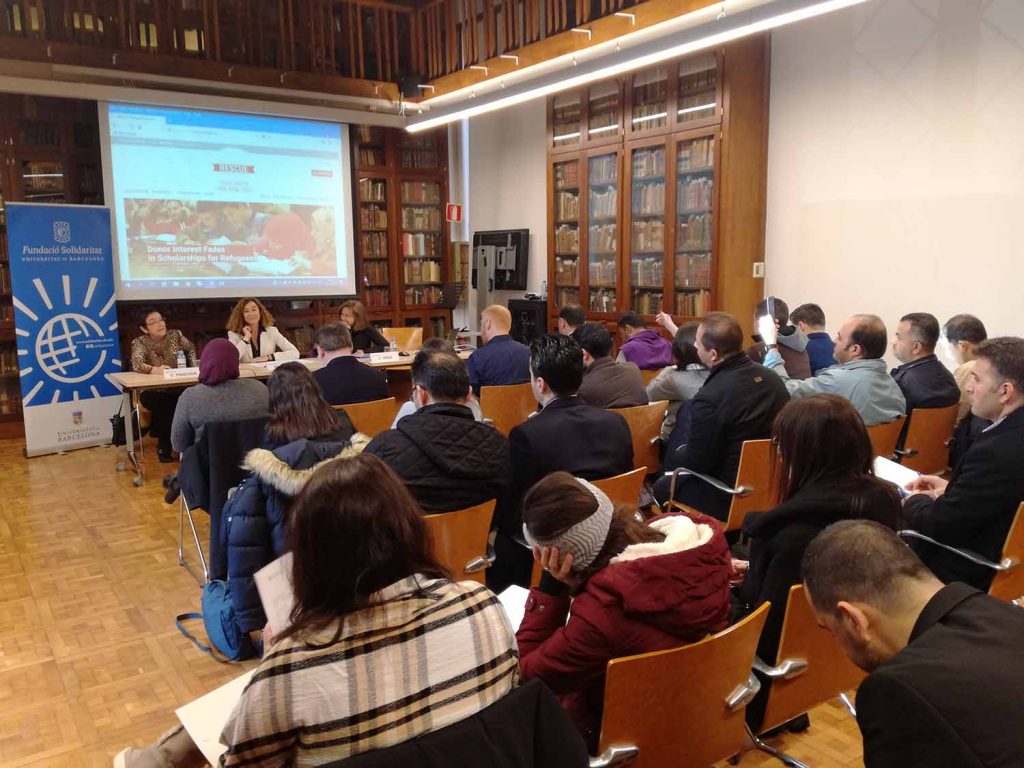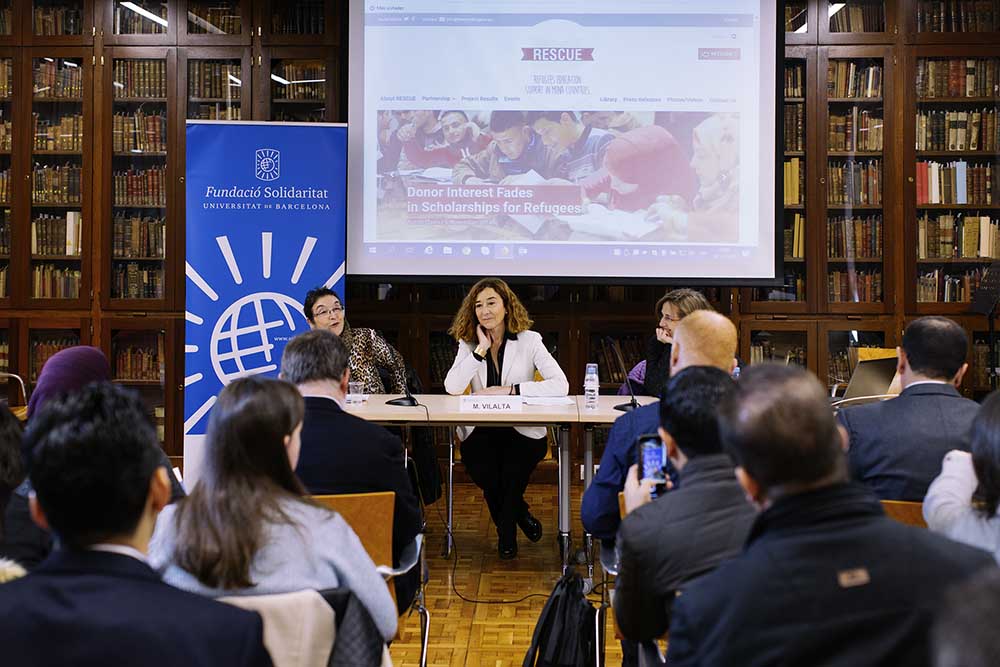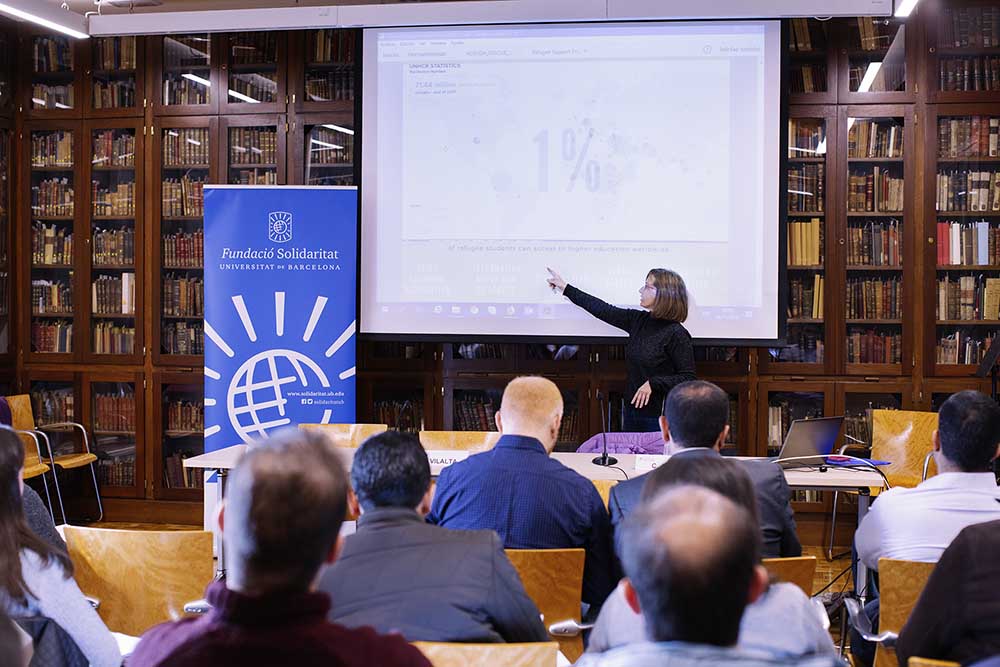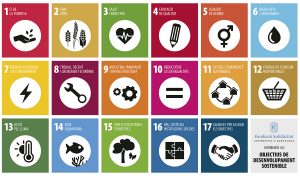Within the framework of the European RESCUE project, members of the support offices for refugee students from universities in Jordan, Lebanon and Iraqi Kurdistan have met with areas of the UB and other entities and administrations that make the Program possible.
 A delegation of 24 people of universities from Jordan, Lebanon and Iraqi Kurdistan visited, on November 28, 29 and 30, the University of Barcelona as part of the European RESCUE project, which aims to improve the access of displaced persons and refugees to universities in the Middle East and Northern Africa through the creation and management of ad hoc support offices. These offices will be operational in the universities of Zarqa, Al-Zaytoonah and Yarmouk (Jordan), Lebanese University and USEK (Lebanon), and Duhok University and Duhok Polytechnic University (Iraq).
A delegation of 24 people of universities from Jordan, Lebanon and Iraqi Kurdistan visited, on November 28, 29 and 30, the University of Barcelona as part of the European RESCUE project, which aims to improve the access of displaced persons and refugees to universities in the Middle East and Northern Africa through the creation and management of ad hoc support offices. These offices will be operational in the universities of Zarqa, Al-Zaytoonah and Yarmouk (Jordan), Lebanese University and USEK (Lebanon), and Duhok University and Duhok Polytechnic University (Iraq).
 One of the actions of the RESCUE project has been the study visit of members of these offices to the University of Barcelona to learn how the actions of the UB Support program for refugees and people from conflict areas are developed and managed.
One of the actions of the RESCUE project has been the study visit of members of these offices to the University of Barcelona to learn how the actions of the UB Support program for refugees and people from conflict areas are developed and managed.
On November 28 the delegation was received by the Vice-Rector of Equality and Social Action of the UB, Maite Vilalta; the academic responsible for the RESCUE project at the UB, Carme Panchón,  and the coordinator of the UB Support Program for refugees, Cati Jerez.
and the coordinator of the UB Support Program for refugees, Cati Jerez.
The Vice-Rector stressed that both this Program and the participation of the UB in the RESCUE project are part of the commitment of the University of Barcelona to defend human rights and contribute to the achievement of the Sustainable Development Goals (ODS) of the 2030 Agenda of the United Nations, which is based on the philosophy of “leaving no one behind“.
On this point, Cati Jerez emphasized that the reason for the UB Support program and RESCUE is that, according to United Nations data, only 1% of refugees at university age have access to university, while the world average is 36%.
The UB Program, which currently covers 28 people and will host another 15 people in the next year, is being developed in coordination with various actors of the University of Barcelona and in cooperation with NGOs and local, supra-municipal and autonomous administrations.
The study visit
In the framework of the study visit, the main lines of the UB Program, and their follow-up and emotional support actions, were presented during the morning of November 28, when students of the first edition of the Program explained their experience. In the afternoon, university representatives from Middle East met with students of the second edition of the Program at one of the residence halls of the UB where they are housed, and where the head of studies explained the work of social integration that is carried out with them. Similarly, the same afternoon, the delegation of university representatives met with members of ACATHI, one of the specialized entities that collaborates with the UB Program in the field of accommodation and support for refugees.
On the second day of the visit, on November 29, the group received information about the asylum system in Spain by the CCOO Information Center for Foreign Workers (CITE), which collaborates with the UB Program in the field of legal advice. The university representatives have known the resettlement dynamics of the Spanish Government according to the arrival route of displaced persons, as well as a very recent development of the Spanish law (pending regulation) that would allow masters and doctorate students to enter the country without the need for a study visa. Next, the delegation held an institutional meeting with Ignasi Calbó, coordinator of the Barcelona Refuge City program of the Barcelona City Council, with which the UB has a collaboration agreement for the development of the Course on Transition to Bachelor’s Degrees and Training in Human Rights and the Culture of Peace, within the Support Program for refugees.
The last day of the visit, on November 30, has focused on meetings with different UB agents that make the Program possible: students of the Faculty of Psychology who have participated in psychosocial accompaniment practices; members of the Academic Management team, with whom a protocol for the recognition of previous studies has been established; members of the Office of Mobility and International Programs, which deal with casuistics related to Erasmus Mundus students; professors of the Faculty of Economics and Business, with which a Tutorial Action Plan was developed, and teachers from the course on transition to bachelor’s degree, which implemented a specific methodology for teaching Catalan and Spanish designed by Linguistic Services.
The RESCUE project (Refugees Education Support in MENA countries)
The RESCUE project, of three years duration (2016-2019), is co-funded by the program Erasmus+ for capacity building in higher education, and is coordinated by the Mediterranean Universities Union (UNIMED), in which the UB takes part.
This news is related to the following SDG of 2030 Agenda:









